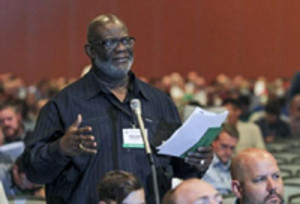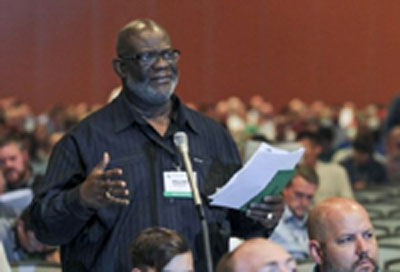
Pastor Dwight McKissic explains why his church is staying in the Southern Baptist Convention
By William Dwight McKissic, Sr.
Lawrence Ware’s recent New York Times op-ed, “Why I’m Leaving The Southern Baptist Convention,” raised questions about race and the future of the country’s largest Protestant denomination, which claims more than 15 million members. As a Black pastor and the author of the SBC’s recent “Alt-Right Resolution,” many have asked me about my commitment to the convention.
I almost left the SBC 11 years ago, but I remain committed to the larger cause. Even when we do not fit well together, when we don’t understand each other and when we struggle to like each other, we need each other.
Cornerstone Baptist Church, where I pastor in Arlington, Tex., has been greatly helped by the SBC since we decided to join the SBC 33 years ago. The SBC needs pastors like me and multicultural congregations like the one I pastor to accomplish our shared mission to evangelize the entire world for Christ.
Believe me, there are plenty of things in the SBC that make me uncomfortable, and I don’t always agree with the decisions made by the most prominent leaders in the SBC. In 2006, I spoke out against certain policies of the SBC’s International Mission Board regarding missionaries that have since been reversed. Everyone did not appreciate my criticism, and I considered leaving the SBC, but I stayed.
Some have called me “the racial conscience of the SBC” as I have spoken on the need for racial inclusion and empowerment. Many deny or even acknowledge that the SBC preserves a white-dominated culture. But until it is acknowledged and addressed, all SBC constituents will not share equitably in decision-making.
Many SBC leaders are uncomfortable with discussing racial inequity within their ranks. I understand being uncomfortable; it is uncomfortable for me and some of my col-leagues to feel like we are in someone else’s house — invited for dinner, but told to sit at the kids’ table instead of with the grown-ups, who are calling the shots for the whole party.
A resolution I submitted for consideration this year dealt with the alt-right movement and the white supremacist ideology that animates it. Even though it ultimately passed in an edited form, the resolutions committee initially rejected it. Whether the committee’s members consider it a factor in their decision, the panel is largely made up of people who are white, people with historical power and privilege. Of course, you have what you are born with, but people with power and privilege need the voice of racial minorities to understand our different experiences. Because the committee contained only one African American member out of 10 members, the panel failed to prioritize the need to subvert white supremacy in all its expressions.
I don’t like seeing minorities underrepresented on stage and in leadership at the annual SBC meetings. I’m thankful many of our churches have racial minorities playing in bands and praise teams, but bands and praise teams don’t make the decisions that affect all SBC churches. Committees, employees and trustees make the decisions that have the largest impact on all of our churches.
Unfortunately, some people view my church’s dual alignment with the National Baptist Convention (NBC) — the country’s largest majority-Black denomination, with 7.5 million members — as “two-timing.” How quickly some forget the SBC has not always co-operated with pastors who share my skin color. There’s nothing wrong with having two friendships, one long and reliable, the other new and growing.
Despite these challenges, I am remaining a Southern Baptist for three reasons.
First, my roots with and respect for the SBC run deep. My childhood home was always filled with Southern Baptist books, hymnals and literature. We often shared positive and powerful interactions with Southern Baptists in various venues and contexts in my ear-ly years.
One reason for that is the fraternal and fiscal support the SBC gave the National Baptists and Black Southern Baptists.
At the 2016 SBC Annual Meeting in St. Louis, I watched Ronnie Floyd, the former president of the SBC (2014-2016), share the stage with Jerry Young, the current president of the NBC, a visible sign of hope. The reality is that the relationship between the SBC and NBC has been strained, but could be on the precipice of returning to the fellowship once enjoyed between the two conventions.
Second, my indebtedness to the SBC is huge. I want to give back to the SBC for having poured into NBC fellowships, camps and gatherings in my early youth, college and church-planting years. I am who I am today, in part, because of the SBC.
I received my theological education at an SBC seminary. The SBC provided a sponsoring church for my church plant in Arlington, Tex., and substantial funding for its first three years. I was told that our church plant received more funding than most white SBC church plants because its national leaders really wanted us to succeed. By the grace of God, we have grown to 3,000 members with an average attendance of 1,200 people.
The SBC provided health, life and disability insurance to me at a reasonable cost. The SBC delivered a chapel building, free of charge, for our church plant to incubate in after we outgrew my home garage. The SBC delivered a sponsoring church, Tate Springs Baptist, which taught our children and youth with theirs in Sunday school while I taught our adults. The SBC delivered a loan of $330,000 within 10 months of our church getting started in 1984, a loan that was co-signed by two local SBC congregations. In 1996, the SBC provided a $3 million loan for us to purchase 40 acres and build a 29,000-square-foot facility.
And in return, over the past 33 years, Cornerstone Baptist Church has given close to $2 million to the SBC’s primary funding channel, the Cooperative Program, and other SBC causes, including gifts to other SBC church plants. We want to cooperate with those who have cooperated with us.
Third, my vision for the future of the SBC requires interracial composition. Even though it has been officially integrated since 1951, the SBC is only marginally interracial and most of its churches remain segregated. I choose to work from the inside to improve the racial makeup of the SBC, in order to see the fulfillment of Jesus’ prayer in John 17:21 that his church would be one. If all ethnic minorities abandon the SBC, we will abandon Jesus’ prayer for oneness. By our oneness, Jesus says, “the world may know you have sent me and have loved them as you have loved me” (John 17:23).
When the SBC is persuaded to address the needs of African American communities — such as building up the black family, assisting ex-convicts with employment, removing payday loan offices from our neighborhoods, addressing disparities and inequities in the criminal justice system and addressing police brutality — it will have a huge positive impact on Black SBC churches. When the SBC more intentionally includes minorities in leadership and decision-making throughout the life of our convention — especially in the president-appointed committees — we will see a real change and leave a better SBC for our grandchildren.
A common perception among African American pastors and churches is that in order to be welcomed, we have to park our brains, culture, history, politics, worship practices, critical thinking skills and autonomy at the door. The SBC needs to make it clearer that this is not the case so we can recruit more churches to cooperate with the SBC.
The SBC has its shortcomings, but churches that focus their attention on the mission of our Lord Jesus will not find a better body to cooperate with than the SBC. Not everything in the SBC is what it should be, but I am called to work within to help it become what it can be.
That’s why I remain.
SOURCE: The Washington Post
William Dwight McKissic Sr. has been the senior pastor of Cornerstone Baptist Church in Arlington, Tex., for 33 years. He holds an honorary doctorate from Arkansas Baptist College, a historically Black institution in Little Rock. He is a proud husband, father of four and has 12 grandchildren.

